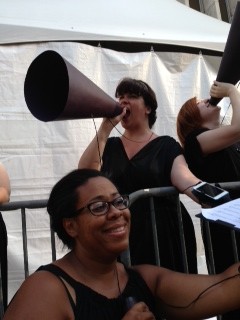
Applause seemed inadequate and inappropriate, like some weird contrivance of civilized life at the end of John Luther Adams’s Sila: The Breath of the World, performed by a dispersed collection of 80 singers and instrumentalists in its July 25 world premiere at Lincoln Center’s Out of Doors festival.
It was like applauding God for creating Magnetic North. Or tundra. Or glaciers
The title refers to Inuit cosmology: Sila is the force behind the force, that which powers everything from life to wind to weather. That’s not out of character from what the 2014 Pulitzer Prize-winning composer, long based in Alaska, has been writing for indoor orchestras – pieces like Become River and Become Ocean. Like Sila, these indoor works often hit a climax of sorts and maintain it to the point that it becomes a static state of being rather than a temporary peak.
As with any modern composer, Adams isn’t afraid to depart from tonality. And though Sila feels tonality’s gravitational pull, it neither yields to it nor floats into some weightless stratosphere. It’s as if he sampled the most emotionally intense moment of the Sibelius Symphony No. 7, held it and played with it in extremely slow motion. Far from the morphing-machine-tooled manner of American minimalists, Sila is more like a glacier that changes over time, even though it might seem stationary while you’re concentrating on it.
The Sibelius 7th moment I’m talking about is one that, in context, would be perceived as an unstable dissonance but is more like the basic substance of Sila‘s landscape. When the harmonies change, they don’t resolve as they would in Sibelius, but open a door to … something.
What it sounded and looked like: The Philadelphia chamber choir The Crossing was dressed in typical black concert dress, but got their long hems and pants legs wet while standing in the Hearst Plaza’s wading pool, whose water was warm enough (I checked) to not cause any summer colds. Strapped to their wrists were phones containing an app that allowed them to get their pitches in natural tunings. The singers were also armed with black megaphones and assigned slow-moving choreography.
On the grassy incline in back of them, brass and woodwind players were lined up to give what was, perhaps, the basis of the piece’s sonority. Along the opposite side of the wading pool were amplified strings. In what may be an intentionally witty touch, some of the violin effects sounded like cell phones.
The sheets of sound were sensuous but rarely felt consonant or at rest. Even if little or nothing was happening by standards of Western music, the piece had an inner restlessness that kept you engaged but didn’t take you hostage. At one point a firetruck went past – and blended rather well.
Being next door to the Metropolitan Opera at this point in time – amid the possibility of a disastrous work stoppage on August 1 – made the event all the more strange. The elemental aesthetic of John Luther Adams never trivialized the Met’s standard relics, even the sillier ones like Il trovatore, but made you wonder why those works attract and foster the sort of grand egos that produce them.
All of that said, I wished that Sila had been indoors. Selfishly, I wanted the more complete sound picture that an indoor performance would provide. And with an indoor setting where the audience was able to walk around, the benefits of outdoor performance would not be lost.
The best things in life may well be free, but when they’re free they’re not widely valued. It’s great that Lincoln Center, which commissioned the piece jointly for its Out of Doors and Mostly Mozart festivals, is so willing to give to the city, and do so with a carefully crafted piece by a major composer. But the audience contingent that casually wanders in and out of any free outdoor concert tended to divert the kind of group energy the piece seemed out to create.
The bright side of outdoor performance is that Sila could’ve flopped and it would not have damaged Adams’s reputation – because the piece was, you know, one of those “outdoor things.” So in theory, outdoor events can lend themselves to more adventurous experimentation. But Sila deserves significant attention, and it’s going to have to come in from the summer heat to get it.
Reader Interactions
Comments
Trackbacks
-
[…] Louis: Ka Nefer-Nefer Case Ends With A Whimper AJBlog: Real Clear Arts | Published 2014-07-30 John Luther Adams’s outdoor music needs to come indoors AJBlog: Condemned to Music | Published […]


You are funny if nothing else …….